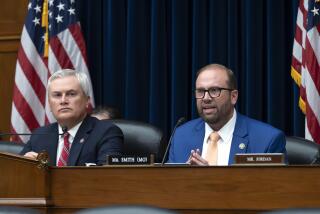The right way to investigate the IRS
The scandal surrounding the Internal Revenue Service’s scrutiny of tax-exempt groups based on their political leanings has prompted investigations by at least four congressional committees and the Justice Department. The acting head of the IRS has been sent packing. And the hearings on Capitol Hill show no sign of abating.
The attention is appropriate because of the troubling questions the scandal raises about the agency’s independence. But the report that brought the episode to light — by J. Russell George, a Treasury Department inspector general — became politicized so quickly that those questions may be given short shrift. The criminal investigation will lead where it may, but we’re less interested in congressional Republicans’ efforts to tie the scandal to President Obama at any cost than we are in finding out how and why the IRS stumbled so badly, and coming up with solutions to fix whatever is broken in the system. That would be done best by a nonpartisan commission working outside the polarized confines of the congressional office buildings.
At issue is the way the IRS enforces the laws governing tax-exempt groups. In particular, the inspector general found that agency employees made inappropriate and intrusive demands for information from many conservative groups that applied for exemption under Section 501(c)(4) of the tax code. Unlike charities, 501(c)(4) organizations can do a limited amount of political campaigning. The inspector general’s report shed no light on why IRS employees started singling out those conservative groups, why they sought donor lists and other seemingly inappropriate information, whether the IRS had conducted or still conducts reviews that are similarly focused, and what involvement, if any, Obama administration officials and members of Congress had in the extra scrutiny.
No matter what the answers are, the public needs to be assured that the IRS can enforce the law independently and fairly. The agency’s initial explanation — that low-level, politically tone-deaf employees were responsible — only reinforces the fact that IRS agents have tremendous power at their disposal, and they can misuse it for months before anyone stops them. Yet even the most apolitical IRS staffer might have trouble taking the politics out of Section 501(c)(4), because agency rules don’t draw a very clear line between groups that do too much political campaigning to qualify for the exemption and those whose political activity isn’t excessive.
Campaign finance reformers rightly complain that the IRS has been too permissive when it comes to political activity by 501(c)(4)s, which, unlike other groups involved in campaigns, can hide the identity of their donors. So the agency is being buffeted by accusations that it is both failing to enforce the law and that it is enforcing the law in a politically biased way. The IRS is never going to be a popular institution, but it can’t afford to be seen as serving a political master. The best way to restore confidence in the IRS is to impanel a commission with no stake in the 2014 election and no political ax to grind, and have it recommend whatever changes may be necessary to fix the problems it uncovers.
More to Read
A cure for the common opinion
Get thought-provoking perspectives with our weekly newsletter.
You may occasionally receive promotional content from the Los Angeles Times.










